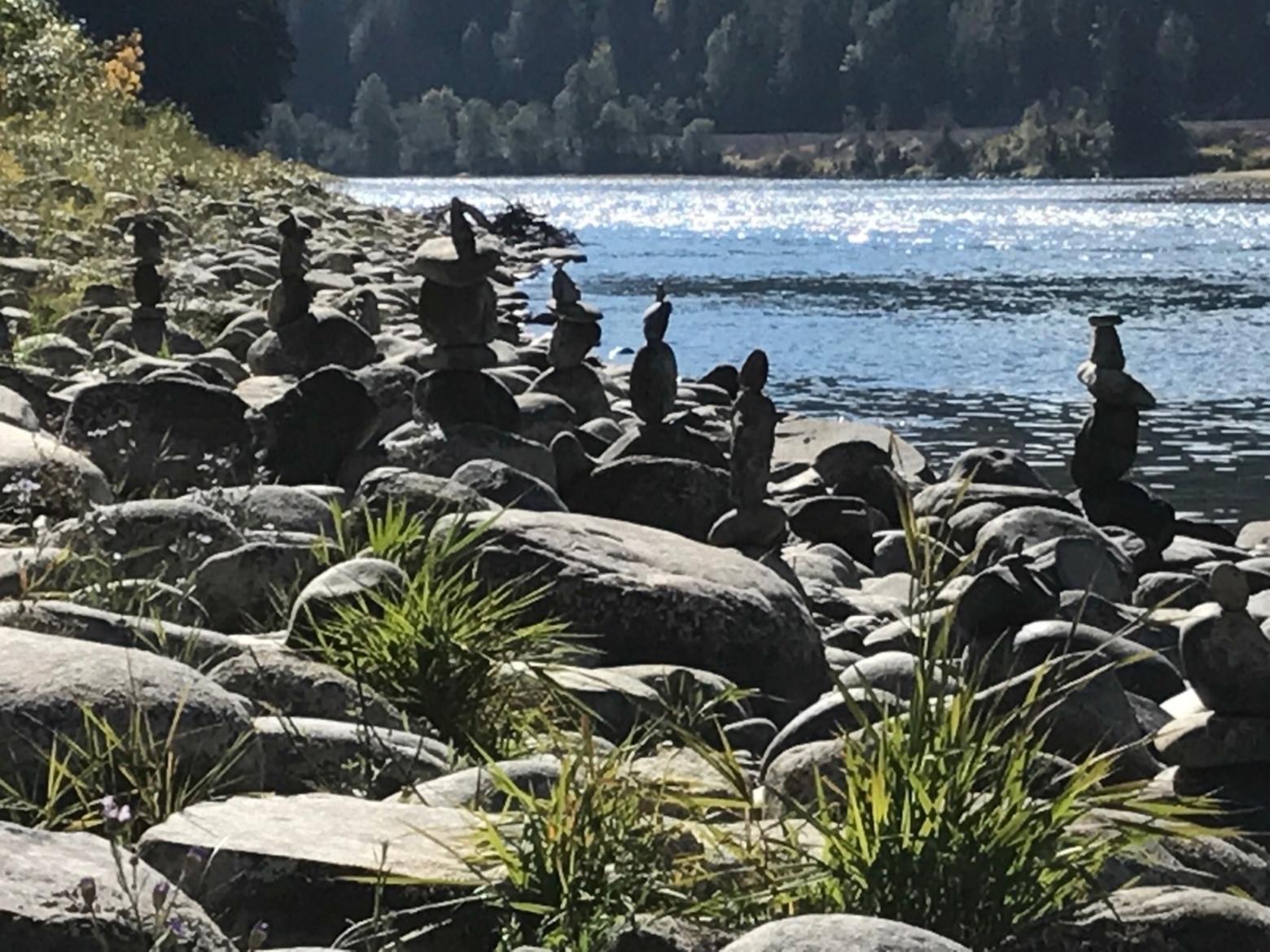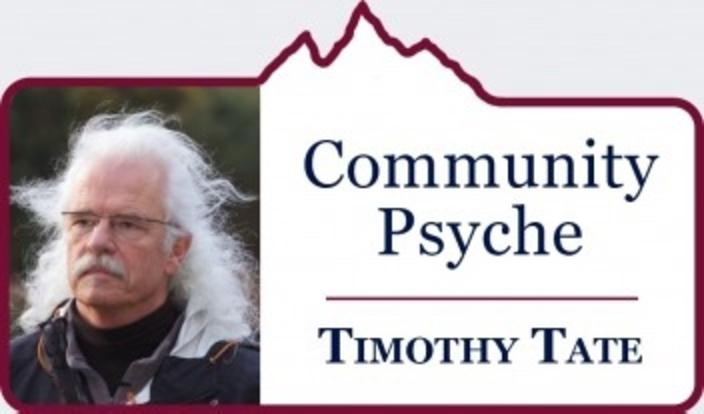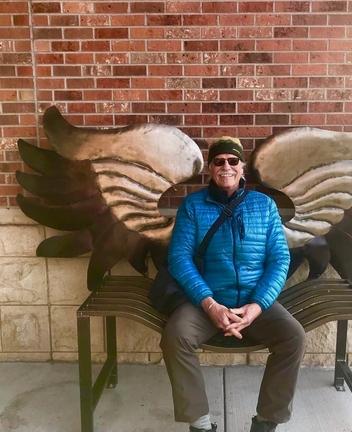Back to StoriesTouching Meaning In A Small-Town Funeral Procession
October 1, 2017
Touching Meaning In A Small-Town Funeral ProcessionBozeman Psychotherapist Timothy Tate Riffs On The Struggles Of Living Beneath The Big Sky
As a psychotherapist, I welcome individuals
who come to see me behind The Blue Door, like I would otherwise greet messengers
coming in and sharing details of their long, hazardous journeys.
We dispense with formalities such as intake forms
or health insurance information by skipping them and going directly to the
question: What is on your mind?
In future rendezvous with you here in
this space, I will generally share the kinds of troubles that I listen to, like
an old man telling stories about the human condition to curious listeners
who, in their heart of hearts, know that each story is everyone's and, in some
ways, their own.
We may dwell in the Greater Yellowstone
Ecosystem but these stories are, fundamentally, universal.
Today I am writing this column on the bank of
the Kootenai River eight miles west of Troy, Montana where the town’s welcome
sign states Where Montana Begins, and
is set among the old-growth cedar, fir, and
tamarack. It is located far from Greater Yellowstone, just south of Canada, at
the intersection where the Northern Rockies press up against the Pacific Northwest rainforest.
I drove into Troy in early afternoon to buy
provisions for the remaining three days of my five-day retreat. The Yaak River
pours into the Kootenai a hundred yards from where I sit as it finishes its
journey down the Yaak Valley, known from the writing of Rick Bass [who is
presently a writer-in-residence at Montana State University].
I come here annually in late September to escape
the modern digital world. All of us need decompression. Montana has fifty-six
counties, each represented on our license plates by descending order of population. The most populous receive single digits. Lincoln County, where Troy is located, bears
the number 56. That’s why I was impressed by the sheriff’s SUV and its flashing
lights leading a funeral procession that stretched past The Booze N’ Bait Store,
the red brick two- story high school, home of the Trojans, and on out of sight to the west towards the local
cemetery.
When someone dies here, the community notices.
Later, while purchasing a fifth of Irish
whiskey at the Booze N’ Bait, I came to find out from the store’s proprietor
that the funeral was for a thirty-one year old local woman, who, while driving across
Montana to get to her job, fell asleep at the wheel and crashed head-on into a
school bus just thirty-five miles from her destination.
A majority of the town folk drove solemnly
down Main Street, men in work clothes and older diesel pick-ups, smoking cigarettes
through open windows, to honor her death. Other vehicle traffic pulled over on
the roadside flanking her final ride home.
Only in death did it register to so many how
much the woman mattered to others.
Upon hearing this story I addressed another woman
behind the till who was helping me out.
I told her that, based on my experience, losing a child is my worst
nightmare; it chronically, quietly, lurks in the background of my mind, for I
have seen the accumulated grief.
She assured me that was her nightmare as well,
to lose a child out of turn in the long walk leading from birth to death.
To which I said, “And that’s why some of us
drink.”
“I’m with you there,” was her response.
Walking across the parking lot back to my
pick-up it felt like I could taste the salt in the town’s tears.
Montana is like that. We have so few citizens
dispersed across such expansive territory. I drove over 400 miles to get to
Troy starting from south central Montana. You could drive roughly from Boston to
Washington, D.C. in that distance, moving from North to South and encounter
radical differences in cultural affinity and pass through the figurative
backyards of tens of millions of people.
Yet in Montana we are tied inexorably
together by vast open spaces, inhabited by human euphoria and crushing
loneliness and differing senses of personal numbness and detachment.
Who knows why this gal who died drove onward
despite suffering from a fatal stupor of fatigue, but I bet it might have had to
do with the paradox of being a responsible Western woman believing she could
not stop and rest. In our compulsion to get somewhere and do our duty, it is nothing
for us to drive under challenging weather conditions, be it a sudden winter
whiteout or a roadway with visibility choked by the wood smoke of a forest wildfire.
"No amount of external stimuli or hard riding enables people to escape the mandatory seeking and soul-searching that resides within ourselves."
There is a sense of personal expansiveness
that comes with big country and we convince ourselves that we must courageously
blaze paths forward into it. I know that my idea of personal space is wrecked
by nearly forty years of gazing across our eastern plains and badlands or the
wide sweeping mountain valleys to our west. If I can’t see the mountains, I feel trapped.
Our state’s natural beauty does not protect us
from our private troubles any more than solitary, self-sufficient people escape
suicidal thoughts. Montana does after all
rank number one in suicides per population percentage.
What I hear regularly behind The Blue Door are
stories about fellow community members who are truly courageous in owning up to
the fact that no matter how busy, fit, or financially successful they may be,
there is a nagging lack of personal meaning.
Their emptiness cannot be filled by a radical mountain biking ride, cramming
the schedule with more events, or getting richer in order to claim greater
happiness.
No amount of external stimuli or fast living enables people to escape the mandatory seeking and soul-searching that resides within ourselves.
Certainly you have heard of attention deficit,
a distracted ping-pong approach to life’s demands. Much worse than this pesky
disorder, which in my practice is at an all-time high, is meaning deficit.
A
privately held sense of meaningless life experiences—never feeling good enough—is
a central tap root within our human psyche that sprouts a variety of weak
limbs: addiction, sleeplessness, compulsive exercise, nervous agitation, and
chronic low grade depression.
I will explore each of these in subsequent
columns but first let me clarify the nature and effect of feeling ill formed or absent meaning in who we
are, i.e. the deep sense, common to many people and most of us at points during
our lives, of feeling lost, aimless, purposeless.
Know this: meaning must be created; it cannot
be passed along. You do not inherit it.
Meaning comes from searching and by awakening to the fact that each of
us is not bound to follow a script of how we are supposed to live handed to us by somebody
else.
No matter what strongly-held beliefs a person
may hold, they do not automatically take care of the personal quest to discover
meaning in one’s life. Whether financially wealthy or savvy or clever or
handsome or beautiful, athletic or intellectually smart, none of us are spared the private
challenge of figuring out how to create a meaningful life.
"Whether financially wealthy or savvy or clever or handsome or beautiful, athletic or intellectually smart, none of us are spared the private challenge of figuring out how to create a meaningful life."
What I am on the lookout for is the the
moment when a fifty-two year old divorcee with two children or a dispirited
thirty-five year old fishing guide realizes, as they hear themselves speak out
loud, that they no longer can pretend to get it. This is the swiftly fleeting
moment of self-realization: my show is over, it’s time to go to work. I have no
idea who I am, and that is the good news.
Now, let’s discover who is actually
abiding, hidden in your bashful, unsullied character, and give her a crack at
being born.
From the ashes of who I thought I was, or at
least had to be, a glowing ember burst into flames, as I blew my life force at
its concentrated heat. As my friend, Franz, a photographer and giver of art lessons, said to me as we stood next to my
camping trailer, “I had to find a form of self-expression or I was becoming the man who mowed the lawn, waiting for it grow,
so I could mow it again.”




